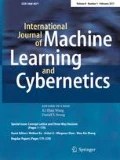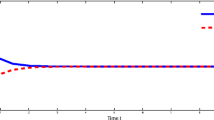Abstract
In this paper, the passivity problem is researched for discrete-time stochastic neural networks with time-varying delay. By utilizing a novel Lyapunov–Krasovskii functional, delay-decomposition method and reciprocally convex approach, some sufficient delay-dependent passivity conditions are established in the form of linear matrix inequalities. Furthermore, these new criteria do not require all the symmetric matrices involved in the employed Lyapunov–Krasovskii functional to be positive definite. Finally, three numerical examples are given to illustrate the reduced conservatism and effectiveness of the proposed method.



Similar content being viewed by others
References
Duan L, Huang L (2014) Periodicity and dissipativity for memristor-based mixed time-varying delayed neural networks via differential inclusions. Neural Netw 57:12–22
Park PG, Ko JW, Jeong C (2011) Reciprocally convex approach to stability of systems with time-varying delays. Automatica 47:235–238
Chen W, Zheng W (2006) Global asymptotic stability of a class of neural networks with distributed delays. IEEE Trans Circuits Syst I 53:644–652
Tsang ECC, Wang X, Yeung DS (2000) Improving learning accuracy of fuzzy decision trees by hybrid neural networks. IEEE Trans Fuzzy Syst 8:601–614
Wang X, Dong C, Fan T (2007) Training T-S norm neural networks to refine weights for fuzzy if-then rules. Neurocomputing 70:2581–2587
Zhang D, Yu L (2012) Exponential state estimation for Markovian jumping neural networks with time-varying discrete and distributed delays. Neural Netw 35:103–111
Shi K, Zhu H, Zhong S, Zeng Y, Zhang Y (2015) New stability analysis for neutral type neural networks with discrete and distributed delays using using a multiple integral approach. J Frankl Inst 352:155–176
Cheng J, Xiong L (2015) Improved integral inequality approach on stabilization for continuous-time systems with time-varying input delay. Neurocomputing 160:274–280
Liu P (2013) Delay-dependent global exponential robust stability for delayed cellular neural networks with time-varying delay. ISA Trans 52:711–716
Liu P (2012) A delay decomposition approach to robust stability analysis of uncertain systems with time-varying delay. ISA Trans 51:694–701
Wu Z, Shi P, Su H, Chu J (2012) Stability and disspativity analysis of static neural networks with time delay. IEEE Trans Neural Netw Learn Syst 23:199–210
Duan L, Huang L, Guo Z (2014) Stability and almost periodicity for delayed high-order Hopfield neural networks with discontinuous activations. Nonlinear Dyn 77:1469–1484
Zhu Q, Cao J (2010) Stability analysis for stochastic neural networks of neutral type with both Markovian jump parameters and mixed time delays. Neurocomputing 73:2671–2680
Yang R, Zhang Z, Shi P (2010) Exponential stability on stochastic neural networks with discrete interval and distributed delays. IEEE Trans Neural Netw 21:169–175
Xu S, Lam J (2008) A survey of linear matrix inequality techniques in stability analysis of delay systems. Int J Syst Sci 39:1095–1113
Chen Y, Xue A, Zhang W, Zhou S (2010) Robust exponential stability conditions for retarded systems with Lipschitz nonlinear stochastic perturbations. Int J Robust Nonlinear 20:2057–2076
Kwon O, Park M, Lee S, Park JH, Cha E (2013) Stability for neural networks with time-varying delays via some new approaches. IEEE Trans Neural Netw 24:181–193
Zhang H, Liu Z, Huang G, Wang Z (2010) Novel weighting-delay-based stability criteria for recurrent neural networks with time-varying delay. IEEE Trans Neural Netw 21:91–106
Zhang H, Wang Z, Liu D (2014) A comprehensive review of stability analysis of continuous-time recurrent neural networks. IEEE Trans Neural Netw 25:1229–1262
Cheng J, Zhu H, Ding Y, Zhong S, Zhong Q (2014) Stochastic finite-time boundedness for Markovian jumping neural networks with time-varying delays. Appl Math Comput 242:281–295
Wang Z, Wei G, Feng G (2009) Reliabe \(H_\infty \) control for discrete-time piecewise linear systems with infinite distributed delays. Automatica 45:2991–2994
Kwon OM, Park MJ, Park JH, Lee SM, Cha EJ (2013) New criteria on delay-dependent stability for discrete-time neural networks with time-varying delays. Neurocomputing 121:185–194
Shen B, Ding X, Wang Z (2013) Finite-horizon \(H_\infty \) fault estimation for linear discrete time-varying systems with delayed measurements. Automatica 49:293–296
Zhang Z, Zhang Z, Zhang H, Karimi HR (2014) Finite-time stability analysis and stabilization for linear discrete-time system with time-varying delay. J Frankl Inst 351:3457–3476
Mathiyalagan K, Sakthivel R, MarshalAnthoni S (2012) Exponential stability result for discrete-time stochastic fuzzy uncertain neural networks. Phys Lett A 376:901–912
Kan X, Shu H, Li Z (2014) Robust state estimation for discrete-time neural networks with mixed time-delays, linear fractional uncertainties and successive packet dropouts. Neurocomputing 135:130–138
Wang T, Zhang C, Fei S, Li T (2014) Further stability criteria on discrete-time delayed neural networks with distributed delay. Neurocomputing 111:195–203
Hien LV, An NT, Trinh H (2014) New results on state bounding for discrete-time systems with interval time-varying delay and bounded disturbance inputs. IET Control Theory Appl 8:1405–1414
Lozana R, Brogliato B, Egeland O, Maschke B (2007) Dissipative systems analysis and control: theory and applications, 2nd edn. Springer, London
Zhang B, Xu S, Lam J (2014) Relaxd passivity conditions for neural networks with time-varting delays. Neurocomputing 142:299–306
Ji DH, Koo JH, Won SC, Lee SM, Park JH (2011) Passivity-based control for Hopfield neural networks using convex representation. Appl Math Comput 217:6168–6175
Wu Z, Park JH, Su H, Chu J (2012) New results on exponential passivity of neural networks with time-delays. Nonlinear Anal Real World Appl 13:1593–1599
Lee TH, Park MJ, Park JH, Kwon OM, Lee SM (2014) Extended dissipative analysis for neural networks with time-varying delays. IEEE Trans Neural Netw Learn Syst 25:1936–1941
Zeng H, He Y, Min Wu, Xiao H (2014) Improved conditions for passivity of neural networks with a time-varying delay. IEEE Trans Cybernetics 44:785–792
Zhao Z, Song Q, He S (2014) Passivity analysis of stochastic neural networks with time-varying delays and leakage delay. Neurocomputing 125:22–27
Wu Z, Shi P, Su H, Chu J (2013) Dissipativity analysis for discrete-time stochastic neural networks with time-varying delays. IEEE Trans Neural Netw Learn Syst 24:345–355
Song Q, Liang J, Wang Z (2009) Passivity analysis of discrete-time stochastic neural networks with time-varying delays. Neurocomputing 72:1782–1788
Raja R, Raja UK, Samidurai R, Leelamani A (2014) Passivity analysis for uncertain discrete-time stochastic BAM neural networks with time-varying delays. Neural Comput Appl 25:756–766
Shi G, Ma Q, Qu Y (2013) Robust passivity analysis of a class of discrete-time stochastic neural networks. Neural Comput Appl 22:1509–1517
Acknowledgments
National Natural Science Foundation of China (61273015). The natural science research project of Fuyang Normal College(2013FSKJ09).
Author information
Authors and Affiliations
Corresponding author
Rights and permissions
About this article
Cite this article
Kang, W., Zhong, S. & Cheng, J. Relaxed passivity conditions for discrete-time stochastic delayed neural networks. Int. J. Mach. Learn. & Cyber. 7, 205–216 (2016). https://doi.org/10.1007/s13042-015-0428-4
Received:
Accepted:
Published:
Issue Date:
DOI: https://doi.org/10.1007/s13042-015-0428-4



